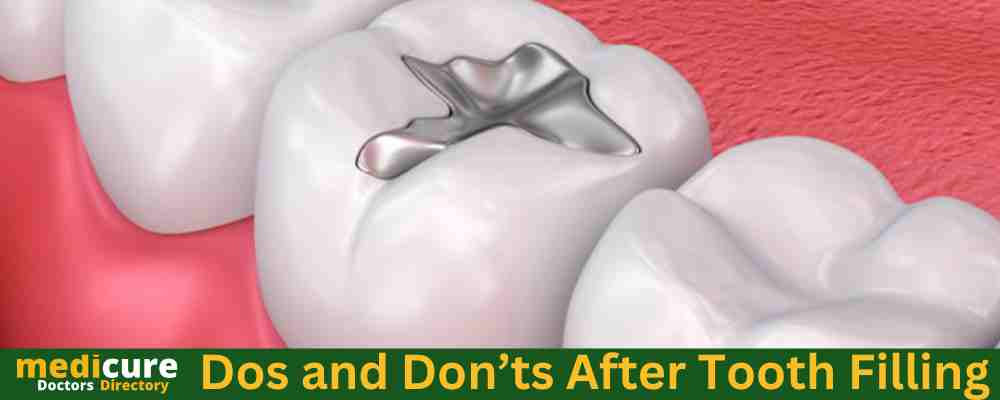MediCure

Dos and Don’ts After Tooth Filling: A Comprehensive Guide
- April 5, 2023
- 0 Likes
- 0 Comments
Dos and Don’ts After Tooth Filling: When it comes to maintaining good dental health, it’s essential to be aware of the dos and don’ts after tooth filling. Fillings are typically done to treat cavities, and it’s crucial to take care of your teeth after the procedure to ensure the filling lasts as long as possible.
Thank you for reading this post, don't forget to subscribe!Dos and Don’ts After Tooth Filling
In this article, we’ll take a closer look at the dos and don’ts after tooth filling, so you know what to expect and how to take care of your teeth post-procedure.
Dos and Don’ts After Tooth Filling
What to Expect After a Tooth Filling
After a tooth filling procedure, it’s normal to experience some discomfort or sensitivity in the affected area. This is because the filling material needs some time to settle and bond with your tooth. The amount of discomfort you experience can vary depending on the size of the filling and the type of filling material used. However, it should only last a few days to a week.
The Dos After Tooth Filling
Do: Maintain Good Oral Hygiene
It’s essential to continue practicing good oral hygiene after a tooth filling. Clean your teeth two times every day and floss day to day to eliminate any food particles and plaque development. This will help prevent any further decay in the affected tooth and ensure your filling lasts as long as possible.
Do: Eat Soft Foods
After a tooth filling, it’s best to stick to soft foods for a few days to give your tooth time to heal. Avoid hard or crunchy foods that may put pressure on the filling and cause discomfort. Instead, opt for softer foods like mashed potatoes, soup, or scrambled eggs.
Do: Take Over-the-Counter Pain Relievers
If you experience any discomfort or sensitivity after the tooth filling procedure, you can take over-the-counter pain relievers like ibuprofen or acetaminophen. Be sure to follow the instructions on the label and avoid exceeding the recommended dosage.
Do: Be Gentle When Brushing and Flossing
It’s important to continue brushing and flossing your teeth after a tooth filling. However, you should be gentle and avoid putting too much pressure on the affected tooth. Use a soft-bristled toothbrush and be careful when flossing around the filling.
Do: Be Mindful of Temperature Changes
After a tooth filling, you may experience sensitivity to hot or cold temperatures. To minimize any discomfort, try to avoid consuming extremely hot or cold foods and beverages. If you do eat or drink something hot or cold, wait a few minutes before consuming anything else.
The Don’ts After Tooth Filling
Don’t: Chew Hard Foods
After a tooth filling, it’s best to avoid chewing on hard foods like ice or hard candy. These can put pressure on the filling and cause it to crack or come loose. Stick to softer foods like cooked vegetables or pasta.
Don’t: Consume Sticky or Crunchy Foods
Sticky or crunchy foods like caramel, taffy, or popcorn can also put pressure on the filling and cause it to become dislodged or damaged. It’s best to avoid these types of foods until your tooth has fully healed.
Don’t: Smoke or Use Tobacco Products
Smoking or using tobacco products can delay the healing process and increase the risk of complications after a tooth filling. It’s best to avoid smoking or using any tobacco products for at least 24-48 hours after the procedure.
Don’t: Drink Alcohol
Alcohol can also slow down the healing process and increase the risk of complications. It’s best to avoid drinking alcohol for at least 24-48 hours after the tooth filling procedure.
Don’t: Use Your Teeth as Tools
Avoid using your teeth to open packages or bite your nails after a tooth filling. Using your teeth as tools can put pressure on the filling and cause it to become dislodged or damaged.
Dos and Don’ts After Tooth Filling

When to Call Your Dentist
While discomfort and sensitivity are normal after a tooth filling, there are some cases where you should contact your dentist. If you experience severe pain, swelling, or bleeding, contact your dentist immediately. Additionally, if the filling feels loose or falls out, you should also contact your dentist as soon as possible.
Conclusion
Taking care of your teeth after a tooth filling is essential to ensure the filling lasts as long as possible. Following the dos and don’ts outlined in this article will help you avoid complications and keep your teeth healthy. Remember to maintain good oral hygiene, eat soft foods, and avoid chewing on hard or sticky foods. If you experience any severe pain or complications, contact your dentist immediately.
Dos and Don’ts After Tooth Filling
FAQs
How long does it take for a tooth filling to settle?
It can take a few days to a week for a tooth filling to settle and bond with your tooth.
Can I brush my teeth after a tooth filling?
Yes, it’s important to continue brushing and flossing your teeth after a tooth filling. However, be gentle and avoid putting too much pressure on the affected tooth.
Can I eat normally after a tooth filling?
After a tooth filling, it’s best to stick to soft foods for a few days to give your tooth time to heal. Avoid hard or crunchy foods that may put pressure on the filling and cause discomfort.
Is it normal to experience sensitivity after a tooth filling?
Yes, it’s normal to experience some discomfort or sensitivity after a tooth filling. This ought to just last a couple of days to seven days.
How can I prevent further decay after a tooth filling?
Practicing good oral hygiene is key to preventing further decay after a tooth filling. Clean your teeth two times every day and floss day to day to eliminate any food particles and plaque development.
Also Read: